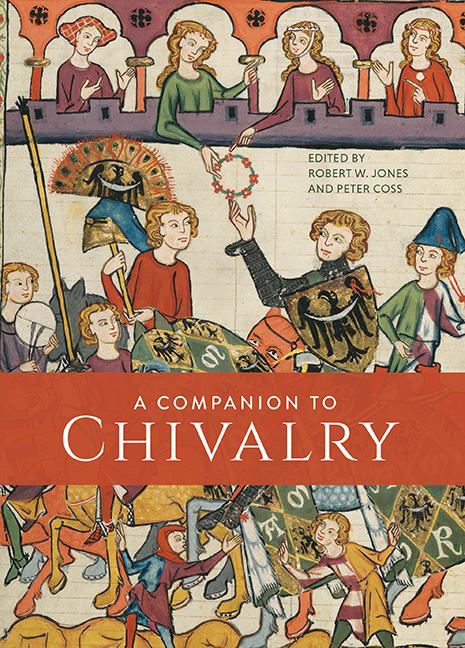Book contents
- Frontmatter
- Contents
- List of Illustrations
- List of Contributors
- Introduction
- 1 The Origins and Diffusion of Chivalry
- 2 The Organisation of Chivalric Society
- 3 The Secular Orders: Chivalry in the Service of the State
- 4 The Military Orders
- 5 Marshalling the Chivalric Elite for War
- 6 Chivalric Violence
- 7 Chivalry in the Tournament and Pas d'Armes
- 8 Heraldry and Heralds
- 9 Arms and Armour
- 10 Constructing Chivalric Landscapes: Aristocratic Spaces Between Image and Reality
- 11 Gendered Chivalry
- 12 Chivalric Literature
- 13 Manuals of Warfare and Chivalry
- 14 The End of Chivalry? Survivals and Revivals of the Tudor Age
- 15 Chivalric Medievalism
- Select Bibliography
- Acknowledgements
- Index
3 - The Secular Orders: Chivalry in the Service of the State
Published online by Cambridge University Press: 24 October 2019
- Frontmatter
- Contents
- List of Illustrations
- List of Contributors
- Introduction
- 1 The Origins and Diffusion of Chivalry
- 2 The Organisation of Chivalric Society
- 3 The Secular Orders: Chivalry in the Service of the State
- 4 The Military Orders
- 5 Marshalling the Chivalric Elite for War
- 6 Chivalric Violence
- 7 Chivalry in the Tournament and Pas d'Armes
- 8 Heraldry and Heralds
- 9 Arms and Armour
- 10 Constructing Chivalric Landscapes: Aristocratic Spaces Between Image and Reality
- 11 Gendered Chivalry
- 12 Chivalric Literature
- 13 Manuals of Warfare and Chivalry
- 14 The End of Chivalry? Survivals and Revivals of the Tudor Age
- 15 Chivalric Medievalism
- Select Bibliography
- Acknowledgements
- Index
Summary
The fourteenth and early fifteenth centuries saw the foundation of a profusion of new chivalric orders. The brainchildren of kings and princes throughout western Europe, these institutions took form during a period in which traditional concepts of chivalry came under increasing scrutiny and when the socio–economic position of members of the chivalric elite was similarly exposed. Developments in military strategy and technology, and the various pressures inflicted by catastrophes such as the Great Famine and repeated outbreaks of the Black Death, created a climate in which the value of knighthood and the status of nobility were called into question. Yet this also formed the environment in which some of the most celebrated medieval chivalric organisations came into being.
Such organisations were not replacements for crusading orders such as the Hospitallers (the Order of Knights of the Hospital of St John of Jerusalem), although the dissolution of the Templars (the Poor Fellow–Soldiers of Christ and of the Temple of Solomon) in 1314 may have provided a context if not a direct motivation for their foundation. Crusading, of course, remained a highly lauded knightly endeavour and members of these new orders were among the most prominent of those who took part in expeditions to southern Spain, or who campaigned alongside the Teutonic Knights in eastern Europe, or who fought in the disastrous Nicopolis expedition (1396). But there is also no doubt that the nature of crusading evolved in the later middle ages and some aspects of its ethos began to be redirected in national interests. For example, the later stages of the Hundred Years War saw both England and France seek to exploit the idealism and propaganda of the crusade for their own ends. Joan of Arc seems to have viewed her own campaign in crusading terms. In her ‘Letter to the English’ (22 March 1429) Joan claimed she had ‘been sent here to drive [the English] out of France by God the King of Heaven’. Once that was accomplished, ‘the French will do the fairest deed that has ever been done for Christianity’ – they would recapture the Holy Land. In a similar fashion, propaganda circulated that portrayed the English as a chosen people akin to the children of Israel and in which kings such as Henry V (r. 1413–22) were compared to the Biblical monarchs David and Solomon.
- Type
- Chapter
- Information
- A Companion to Chivalry , pp. 57 - 68Publisher: Boydell & BrewerPrint publication year: 2019



